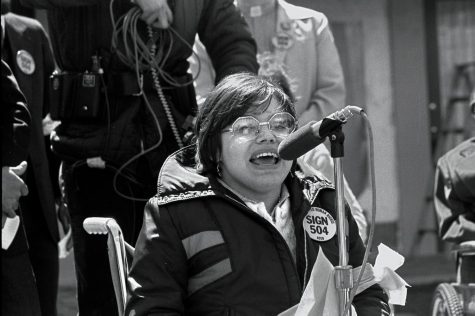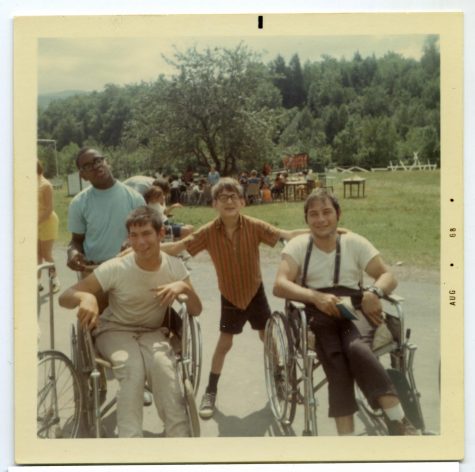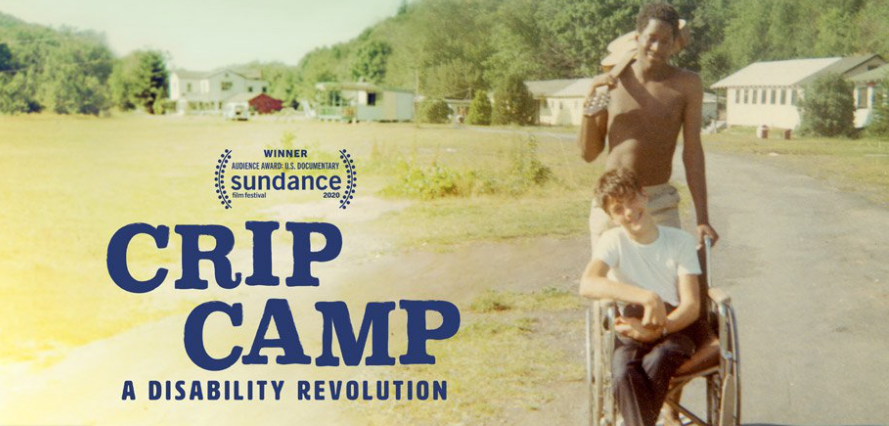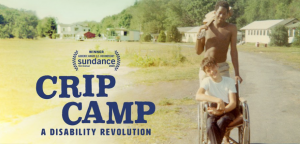Crip Camp: A Disability Revolution
a Documentary that Inspires
May 13, 2020
Crip Camp: A Disability Revolution is the new documentary on Netflix that is sure to resonate with any viewer. The movie centers around the story of how the campers and counselors at a New York camp for the disabled, Camp Jened, grew to become the pioneers of the disability rights movement in the United States during the late seventies. The documentary is incredibly inspiring, and at its core is an exploration of how people have overcome the obstacles they face to change the world in incredibly positive ways. Fittingly, it was produced by former President Barack Obama and Michelle Obama through their production company that has started to focus on inspirational American stories, which Crip Camp surely is. It is a movie that will delight any viewer, and should definitely be one that becomes Netflix’s next viral documentary like the recent Tiger King.
The movie begins with an exploration of Camp Jened, and how all of the documentary’s subjects grew and bonded in the first place they felt they could be themselves. The film then transitions into an incredibly powerful look at the disability rights movement and how the bonds of the former Camp Jened campers transformed into a movement that changed the United States forever. The entire film feels very human, and makes the viewer feel the struggles and joys that all of these people lived through. It truly addresses a major historical event that is often ignored, and shows how meaningful the passage of laws like the Americans with Disabilities Act were for the disabled community.

Judy Heumann speaks at a protest in this photo featured in Crip Camp: A Disability Revolution.
Although the documentary tells the story of many of Camp Jened’s former campers and staff (including James LeBrecht, who directed the film), this is really the story of Judith Heumann, the leader of the disability rights movement. At Camp Jened, Heumann was a camp counselor who the rest of the campers looked up to as a leader and role model. She is incredibly headstrong, fights for what she believes, and does not let anyone stand in her way. She soon becomes a leader of the budding disability rights movement, and watching Crip Camp leaves you in awe of her perseverance and strength. Some of the documentary’s best moments are because of Heumann, like her confrontation with a government official pushing a “separate but equal” solution to the disability activists’ demands or when she breaks down because she feels as if she shouldn’t have to be thankful for an accessible bathroom. After watching, one almost wonders why Heumann has not become a civil rights activist as recognizable as figures like Malala Yousafzai, Greta Thunberg, or even Dr. Martin Luther King, Jr. Crip Camp is truly a look at Heumann’s triumphs in disability rights and how she was able to lead a bunch of former summer campers to force major changes on the federal level.
Even though Crip Camp mostly focuses on the disability rights movement that blossomed thousands of miles away from New York in Berkeley, California, Camp Jened is the focus of the movie. The film makes a point of connecting every single one of the disability rights movement’s successes to the relationships made and developed at Camp Jened many years beforehand, which really gives the documentary a more personal and relatable feel. Seeing how these amazing people were as kids helps Crip Camp’s story truly resonate with any audience, as outstanding historical figures like Judy Heumann are not just civil rights activists we aspire to be, but are also regular camp counselors who we know in our own lives. The focus on Camp Jened also gives the story a much more emotional and nostalgic undertone, as the audience can see how the film’s subjects have grown from rambunctious children to civil rights leaders. In old footage used in the documentary of marches and sit-ins, former campers and staff at Camp Jened are identified so that the audience can really see how these people have grown and developed.

Kids getting the chance to just be kids at Camp Jened.
Another piece of Crip Camp that really makes the documentary something special is how unfazed it is to address uncomfortable and taboo topics. Even the title could seem insensitive and politically incorrect, but in the context of the film, one realizes how perfectly it encaptures this group of people who fought back against society’s prejudices and reclaimed their weaknesses as strengths. There is also the film’s frank discussions about sex and sexuality, which give the subjects a much more human component. As they state in the film, many abled people in society see those with disabilities as asexual, but the movie expertly breaks down these prejudices in ways that makes the audience see the film’s subjects are regular human beings. Denise Sherer Jacobsen, one of the film’s subjects diagnosed with cerebral palsy, talks about her romantic encounters and degree in human sexuality quite bluntly, and in the process helps anyone in the audience overcome their internal biases and misunderstandings to really recognize how these people are so, so much more that their disability. It is uncomfortable, but it makes Crip Camp so much more powerful and helps any audience truly connect with the subjects.
Technically, Crip Camp expertly uses footage from the time period of the events unfolding and never relies on the reenactments and falsehoods that bog down so many similar documentaries. The old footage makes Crip Camp unquestionably real and gives little room for doubt that these amazing events happened. The footage shows the reality of the situations that the documentary’s subjects were undergoing, and does not leave room to mislead or over-dramatize in the ways that other recent documentaries and docuseries have done (looking at you, Tiger King).
The other technical aspect that makes Crip Camp so memorable comes at the end, when several of the film’s subjects return to the site of the long-gone Camp Jened which has become a construction site. When they are walking around the camp, the film cuts between them in the present day and footage of them at camp in a way that heaps on nostalgia and will make almost any audience shed a few tears. This editing leaves Crip Camp on an incredibly emotional and powerful note, imprinting the documentary in the viewer’s mind for long after the credits have rolled.
Crip Camp is one of the best documentaries I have seen in recent years. The film is incredibly uplifting, and will spark joy in anyone’s heart. It also shines a light on a historical movement that not many people know a lot about, and gives amazing activists like Judy Heumann the spotlight that they deserve. It is a movie that will resonate with any audience, and I highly recommend that it should be on everyone’s Netflix lists.







Courtney Lorenz • May 18, 2020 at 5:16 pm
This will be added to my list! I watched a couple episodes of Tiger King and just COULDN’T finish it… this one sounds much more up my alley.
Nicole Dewell • May 13, 2020 at 7:10 pm
Riley, your poignant review has convinced me to watch Crip Camp. Thank you for taking the time to review it.